
CHEMICAL PAPERS
Scope & Guideline
Fostering Academic Excellence in Chemical Disciplines
Introduction
Aims and Scopes
- Synthesis and Characterization of Nanomaterials:
The journal frequently publishes studies on the synthesis, characterization, and application of nanomaterials, emphasizing their properties and potential uses in fields such as catalysis, drug delivery, and environmental remediation. - Green Chemistry and Sustainable Practices:
A significant focus is placed on green chemistry methodologies and sustainable practices, including the development of eco-friendly synthesis routes, waste valorization, and the use of renewable resources. - Analytical Chemistry Techniques:
Research articles often explore innovative analytical techniques for detecting, quantifying, and characterizing chemical substances, especially in environmental and biological matrices. - Photocatalysis and Environmental Remediation:
The journal highlights studies on photocatalytic processes and their applications in environmental remediation, specifically targeting pollutants in water and air. - Computational Chemistry:
There is a consistent emphasis on computational approaches in chemistry, including molecular modeling, DFT calculations, and simulation studies to predict chemical behavior and interactions. - Biochemical and Pharmaceutical Applications:
Research exploring the biochemical properties of compounds, drug design, and delivery systems is prevalent, reflecting the journal's interest in interdisciplinary applications of chemistry.
Trending and Emerging
- Green Synthesis and Biogenic Approaches:
There is a growing trend towards the use of green synthesis methods and biogenic approaches for nanoparticle production and other chemical processes, emphasizing environmentally friendly practices. - Smart Materials and Responsive Systems:
Research on smart materials, including stimuli-responsive hydrogels and nanocomposites, is becoming more prominent, highlighting their applications in drug delivery and sensor technology. - Multifunctional Nanocomposites:
The development of multifunctional nanocomposites that serve multiple purposes, such as antibacterial and photocatalytic properties, is an emerging focus area, reflecting the demand for versatile materials. - Artificial Intelligence and Machine Learning in Chemistry:
The incorporation of AI and machine learning techniques in chemical research for predictive modeling and optimization is rapidly gaining interest, demonstrating the intersection of technology and chemistry. - Sustainable Energy Solutions:
Research aimed at developing sustainable energy solutions, such as advanced battery technologies and photocatalytic systems for CO2 reduction, is increasingly prevalent, aligning with global sustainability goals. - Nanotechnology in Medicine:
The application of nanotechnology in medicine, particularly for targeted drug delivery and diagnostic applications, is an area of growing research, reflecting advancements in biomedical chemistry.
Declining or Waning
- Traditional Organic Synthesis:
There appears to be a decline in the number of publications focusing solely on traditional organic synthesis methods, as the field shifts towards more innovative and sustainable approaches. - Inorganic Chemistry with Limited Applications:
Studies that solely focus on inorganic compounds with limited practical applications are becoming less frequent, as the journal emphasizes more applied research with real-world implications. - Basic Theoretical Studies without Experimental Validation:
There is a noticeable reduction in purely theoretical studies that lack experimental validation, as the journal increasingly favors research that combines both theoretical and experimental approaches. - Single-Disciplinary Research:
The journal is moving away from research that is strictly confined to a single discipline within chemistry, promoting interdisciplinary studies that integrate various fields such as biology, physics, and materials science.
Similar Journals
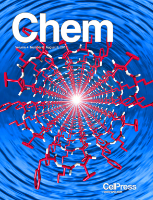
Chem
Unlocking the Secrets of Chemical SciencesChem, published by CELL PRESS, is a renowned academic journal that has rapidly established itself as a leading platform for cutting-edge research in diverse areas such as biochemistry, chemical engineering, materials chemistry, and environmental chemistry. Released under the ISSN 2451-9294, this esteemed journal has achieved an impressive Q1 category ranking across multiple disciplines in 2023, highlighting its significant impact and prominence within the academic community. With a strong focus on innovative studies and interdisciplinary approaches, Chem fosters a vibrant dialogue among researchers, professionals, and students, making it an indispensable resource for those seeking to advance their knowledge and contribute to the evolving field of chemistry. As an open access journal, it aims to democratize knowledge, ensuring that critical research is accessible to a global audience. With its headquarters based in Cambridge, MA, it continues to lead the charge in the dissemination of pivotal findings that shape our understanding of chemical sciences.

RSC Advances
Fostering Collaboration for a Brighter Scientific FutureRSC Advances, published by the Royal Society of Chemistry, is a leading open-access journal that has been a prominent platform for cutting-edge research since its inception in 2011. Recognized globally for its rigorous peer-review process, RSC Advances serves the dynamic fields of Chemical Engineering and Chemistry, holding prestigious rankings within the top quartile of academic journals in both areas. With its impact factor reflecting a growing influence, the journal currently occupies the Q1 category in Chemical Engineering and Q2 in Chemistry as of 2023. Researchers and professionals will find RSC Advances an essential resource for innovative studies and applications that advance scientific knowledge. Additionally, as an open access journal since 2017, it affords wider visibility and accessibility to groundbreaking research, fostering collaboration and engagement in the scientific community. Situated in Cambridge, UK, RSC Advances remains committed to its objective of disseminating high-quality research that catalyzes progress across various disciplines.
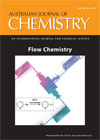
AUSTRALIAN JOURNAL OF CHEMISTRY
Pioneering discoveries in diverse chemical disciplines.The Australian Journal of Chemistry, with an ISSN of 0004-9425 and an E-ISSN of 1445-0038, is a distinguished publication from CSIRO PUBLISHING, dedicated to advancing the field of chemistry since its inception in 1948. Based in Australia, this journal serves as a platform for original research articles, reviews, and innovative studies that encompass a wide spectrum of chemical disciplines, aiming to foster communication and collaboration among researchers globally. Despite its Q3 ranking in the Chemistry (Miscellaneous) category and standing at rank #236 in Scopus’ general chemistry classification, it remains an essential resource for professionals and students seeking to stay informed about emerging trends and discoveries in chemistry. The journal does not offer open access, emphasizing the premium quality of peer-reviewed content that adheres to rigorous academic standards. By bridging theory and practice, the Australian Journal of Chemistry continues to play a crucial role in shaping the future of chemical sciences.

REVUE ROUMAINE DE CHIMIE
Advancing Chemistry: Bridging Local Insights with Global ImpactREVUE ROUMAINE DE CHIMIE is a distinguished academic journal in the field of chemistry, published by EDITURA ACAD ROMANE in Romania. With an ISSN of 0035-3930, this journal has been a valuable platform for disseminating original research and insights in the diverse realm of chemistry since its inception. The journal currently operates under a competitive tier, categorized in Q4 for miscellaneous chemistry fields, as reflected in its Scopus ranking of #348 out of 408, placing it within the 14th percentile. Aiming to foster scientific discourse and innovation, the REVUE ROUMAINE DE CHIMIE provides a repository of knowledge that is crucial for researchers, professionals, and students eager to advance their understanding and contribute to the global chemistry community. By bridging local and international research initiatives, this journal plays an essential role in enhancing the visibility of Romanian scientific contributions on the world stage.

Nature Reviews Chemistry
Pioneering Reviews for the Chemical CommunityNature Reviews Chemistry is a premier journal published by NATURE PORTFOLIO, dedicated to advancing scholarly discourse in the broad field of chemistry. With an impressive impact factor and a ranking in the 99th percentile across its categories—ranked #2 in General Chemical Engineering and #4 in General Chemistry according to Scopus—this journal is recognized for its high-quality, peer-reviewed articles that synthesize and analyze the latest advancements in chemical research. Operating under a convergence framework from 2017 to 2024, Nature Reviews Chemistry aims to provide comprehensive insights and critical examinations of contemporary chemical practices, thereby reinforcing its status as a vital resource for researchers, professionals, and students alike. Although it is not an open-access journal, the breadth and authority of its content make it essential for those looking to stay at the forefront of chemical sciences.
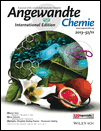
ANGEWANDTE CHEMIE-INTERNATIONAL EDITION
Shaping the Future of Chemical SciencesANGEWANDTE CHEMIE-INTERNATIONAL EDITION, published by WILEY-V C H VERLAG GMBH, stands as a leading journal in the fields of Chemistry and Catalysis, holding a prestigious position with a Q1 ranking in both categories as of 2023. With an ISSN of 1433-7851 and an E-ISSN of 1521-3773, this esteemed publication has been an invaluable resource for the global scientific community since its inception in 1962. The journal's impact is further underscored by its remarkable Scopus rankings, where it occupies the 13th place among 408 journals in General Chemistry and the 4th place among 68 in Chemical Engineering - Catalysis, marking it in the 96th and 94th percentiles, respectively. Although it does not offer Open Access, ANEWANDTE CHEMIE-INTERNATIONAL EDITION remains essential for researchers, professionals, and students seeking to stay abreast of cutting-edge developments and innovations in chemical sciences. Its comprehensive scope and rigorous peer-review process ensure that only the highest quality research finds its way to publication, contributing significantly to the advancement of chemistry worldwide.

INDIAN JOURNAL OF CHEMICAL TECHNOLOGY
Fostering Global Dialogue in Chemical EngineeringThe Indian Journal of Chemical Technology, published by the Natl Inst Science Communication-NISCAIR, is a pivotal platform for the dissemination of innovative research in the field of chemical technology. With an ISSN of 0971-457X and an E-ISSN of 0975-0991, this journal has been serving the academic community since its inception in 1994, and is set to continue through 2024. The journal holds a Q4 ranking in both the Chemical Engineering and Chemistry categories as of 2023, though it showcases a significant breadth of research, making it a valuable resource for both emerging and established scholars. Although it currently operates without an open-access model, the journal aims to facilitate knowledge exchange through rigorous peer-reviewed publications, allowing researchers and professionals to stay updated with the latest advancements and practices in chemical technology. Located in New Delhi, India, the journal not only contributes to national scientific dialogue but also plays a key role in the global conversation around chemical sciences by addressing unique challenges and innovations pertinent to the region.
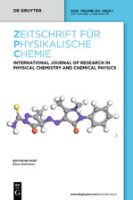
ZEITSCHRIFT FUR PHYSIKALISCHE CHEMIE-INTERNATIONAL JOURNAL OF RESEARCH IN PHYSICAL CHEMISTRY & CHEMICAL PHYSICS
Connecting Theoretical and Experimental FrontiersZEITSCHRIFT FUR PHYSIKALISCHE CHEMIE-INTERNATIONAL JOURNAL OF RESEARCH IN PHYSICAL CHEMISTRY & CHEMICAL PHYSICS, published by WALTER DE GRUYTER GMBH, is a highly regarded platform for researchers in the field of physical chemistry and chemical physics. With an ISSN of 0942-9352 and an E-ISSN of 2196-7156, this journal serves as a vital resource for the dissemination of original research, critical reviews, and insightful discussions that span theoretical and experimental investigations. Recognized for its quality, it holds a Q2 classification within the 2023 quartiles of Physical and Theoretical Chemistry and ranks 72nd out of 189 in the Scopus database, placing it in the 62nd percentile. The journal’s extensive publication history, originating from 1943, showcases its long-standing commitment to advancing the understanding of complex chemical phenomena. Although it currently does not offer open-access options, it continues to attract contributions from leading experts worldwide, making it essential reading for professionals, researchers, and students dedicated to pushing the frontiers of chemical science. The journal is located in Berlin, Germany, at Genthiner Strasse 13, D-10785 Berlin, Germany.

Eurasian Chemico-Technological Journal
Empowering Scholars to Transform Chemical Engineering and Materials ScienceEurasian Chemico-Technological Journal, published by the Institute of Higher Education Academy of Sciences in Kazakhstan, serves as a dynamic platform for scholars and professionals engaged in the interdisciplinary fields of chemical engineering, chemistry, condensed matter physics, and materials science. Since its inception in 1999, the journal has embraced an open access model, enabling broad dissemination of research findings and fostering collaborative innovation across borders. With an ISSN of 1562-3920 and a converged publication schedule extending from 2007 to 2024, it continues to contribute to the global academic dialogue, despite its current standing in Q4 quartiles across several categories on Scopus. The journal ranks in the lower percentiles within its respective fields, yet it remains a valuable resource for emerging research and perspectives within the scientific community. This journal is essential for both seasoned researchers and students, as it reflects the evolving landscape of chemico-technological research while promoting engagement with contemporary issues in the sciences.
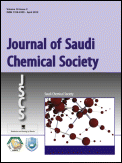
Journal of Saudi Chemical Society
Leading the Charge in Cutting-edge Chemical Discoveries.The Journal of Saudi Chemical Society, published by ELSEVIER, stands as a premier platform for advancing knowledge in the field of chemistry. Since its inception in 2009, this Open Access journal has garnered significant attention, securing a prestigious Q1 ranking in the Chemistry (miscellaneous) category for 2023, reflecting its position among the top journals in the discipline. With an impressive Scopus ranking of #66 out of 408 in General Chemistry, this journal boasts a commendable 83rd percentile, underscoring its impact and relevance in the global research community. The journal aims to disseminate high-quality research articles, reviews, and case studies, fostering innovation and collaboration among chemists and allied professionals. By enabling widespread access to cutting-edge research, the Journal of Saudi Chemical Society plays a crucial role in supporting the educational and professional development of students, researchers, and practitioners alike, making it an essential resource for anyone invested in the dynamic field of chemistry.